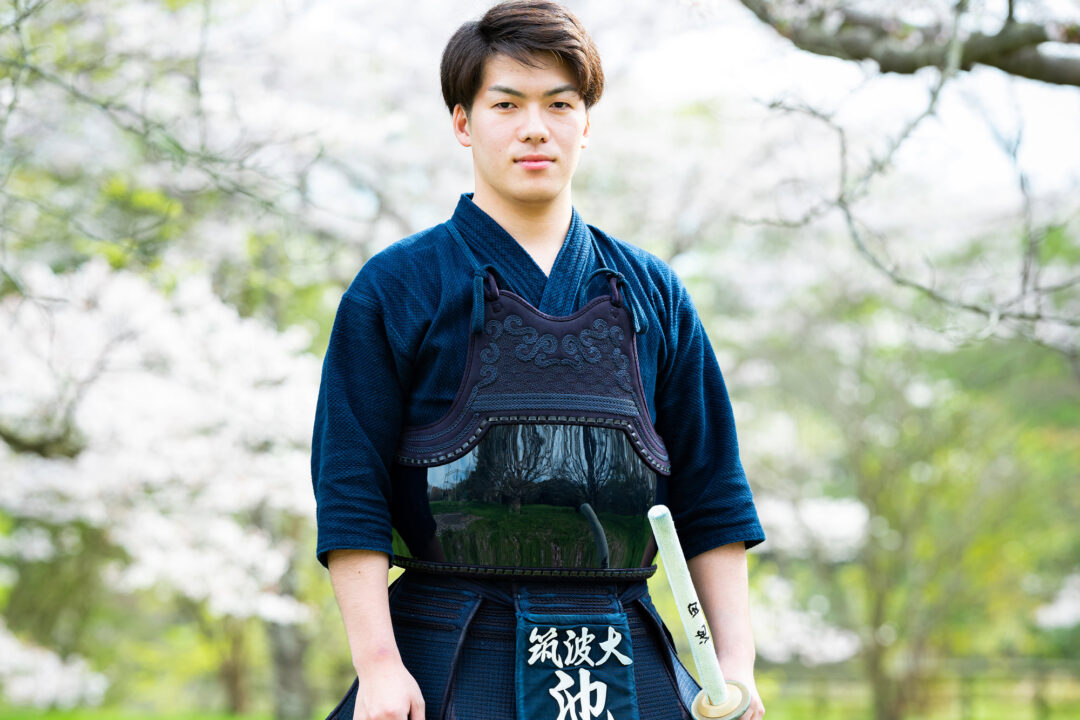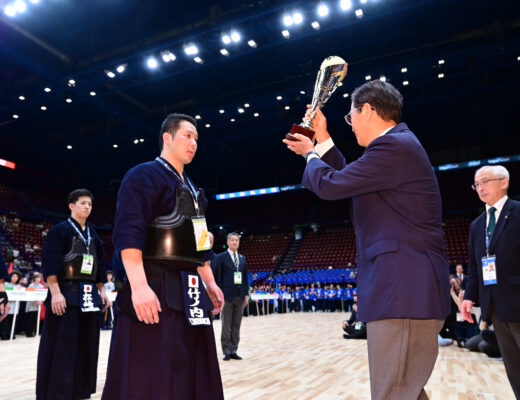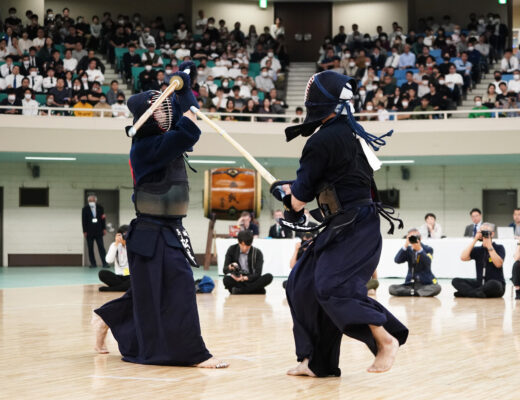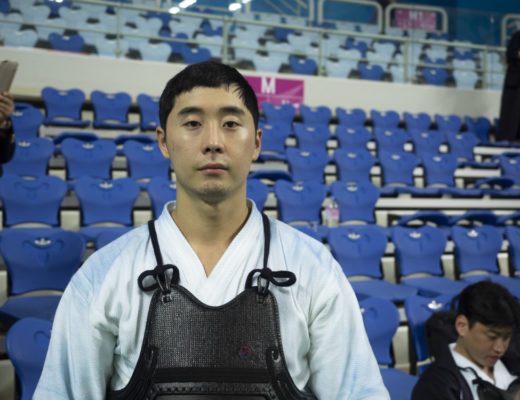2023.6 KENDOJIDAI
Photography: Sasai Takamasa
Translation: Pepijn Boomgaard
Last year, Ikeda Toranosuke’s abilities were on full display. He won the team title at both the Kanto Student Tournament and the All Japan Student Tournament, and he placed third at the All Japan Championship. We asked the University of Tsukuba student about his Kendo career and his plans for the future.
Ikeda Toranosuke
Born in 2001 in Fukuoka. Started Kendo at Fukuoka Josuikan. He went to Fukuoka University Ohori High School and is currently a 4th year student at the University of Tsukuba. His achievements include placing 3rd at the All Japan Championship, placing 2nd at the Kokutai, placing 3rd at the All Japan Interprefecture Tournament, winning the Kanto Student Team Tournament, and winning the All Japan Student Team Tournament. Kendo 4th Dan.
2022, breakthrough year
His training finally paid off
Last season might have been a turning point in Ikeda’s career. “I got the best results I’ve ever had. It was a good year. But I want to do even better this year.” Last year, the fruits of his labor were on full display. He won the team title at both the Kanto Student Tournament and the All Japan Student Tournament, and he placed third at the All Japan Championship. The rising star shined brightly last year.
Ikeda was not on the team in his first two years at the University of Tsukuba. He was a strong player at Ohori High School, placing second at the Gyokuryuki. However, the University of Tsukuba’s Kendo Club is filled with strong people, so it was difficult for him to become a regular player. “I thought I was doing my best, but I was not able to participate in any tournament after entering university. I guess my hard work finally paid off.”
In his second year, he watched from the stands as his twin brother Ryunosuke (now a 4th year student at Chuo University) won the team title at the All Japan Student Tournament. “I was happy for him, but it was also frustrating.” With this frustration in his heart, he steadily continued training. This might have led to last year’s performance. His success at the All Japan Championship was especially noteworthy. He quickly made his way up in a competition filled with the World Championship players and All Japan champions, and finished in third place. He was the talk of the town. “In my second year, I went to support my seniors at the All Japan CHampionship. While watching the matches, I thought, ‘I want to participate someday, too.’ I didn’t think I would be able to participate last year. I was a student and I was the youngest participant. All of my opponent’s were older than me. I thought that it might be hard for them to fight a student. So I decided to fight with my own Kendo to the fullest. This might have been a good thing.”
He defeated Miyamoto Keita (Tokyo Metropolitan Police), who had placed third before, and final eight player Nakazawa Kimitaka (Kochi Prefectural Police) to advance to the semifinals. “I was only focussed on the match in front of me. I felt that if I could just keep my own pace, I might be able to do well.”
This was the seventh time a student made it to the semifinals since the Dan system got abolished in 1995. Only two tournaments ago did his senior Matsuzaki accomplish the same feat. “After making it all the way to the semifinals, I would have liked to win the tournament. However, to be honest, that is not possible with my current abilities. I will train harder and aim to win the next time.”
His grandfather, Ikeda Kenji, went to Fukusho High School and Waseda University, and participated in the first World Championships. He’s the director of Josuikan. He also made it to the final eight at the All Japan Championships.
“My grandfather won the Interhigh individual championship and won the Kanto Student Championship individual title two times in a row. I thought it would be difficult to surpass his record, but I didn’t think I would be able to do it at the All Japan Championships. I’m happy. I want to train harder and achieve even better results.” Ikeda was starting to set his eyes on a new goal.
My time as a junior during the first two years of university gave me strength
Ikeda is a member of the University of Tsukuba Kendo Club, which has the most talented members in collegiate Kendo. Players who have competed in national tournaments such as the Interhigh, the Kokutai, and the All Japan High School Championships are all vying to be the best in Japan. Even though Ikeda is very strong, it is not easy for him to compete with them.
“I couldn’t win any matches within the club, so I began to follow and train with the stronger seniors. Last year, Hoshiko Keita (Tokyo Metropolitan Police) came to the dojo every day and Matsuzaki Kenshiro is in graduate school now.” The more opportunities he has to come in touch with them, the more he can train with them. He was also able to receive a lot of advice.
“I believe that I honed my skills at the university. My seniors taught me a lot about tactics and Seme. I used to attack without thinking much about Maai and Ma, so it was a big change in my view of Kendo.” At first, he was informed that the way he entered into Maai was too big. He was told that he was entering too roughly, and he realized that his perception of attacking and defending the Maai was not good enough.
“My seniors thought about Seme in a very detailed manner, while I always assumed it would just somehow work out. They observed how they’re opponent’s were moving, and planned about how they should set up the match to gain an advantage and score Ippon. I was able to learn from their wonderful way of thinking about Kendo.”
His seniors’ Seme was very precise, down to the way they moved their feet and Shinai. “After learning from my seniors, I became able to take more advantage of opportunities to strike. I didn’t feel like I was getting stronger because I couldn’t win the matches in the club, but now I feel like maybe I was improving a little bit.” For two years, he followed his seniors around with the intention of participating in tournaments. His desire to become stronger might have led to his success last year.
The origin of Ikeda Toranosuke
The Kendo he learned at Josuikan
Ikeda started Kendo at Fukuoka Josuikan, a Dojo founded by his great-grandfather Ikeda Kenji (8th Dan).
“When I was 5 years old, I went to take a look at my grandfather’s place. Ryunosuke didn’t feel the same way, but I was so motivated that I convinced my brother. I remember we went to our grandfather and asked him to let us start Kendo.”
Kendo was fun for Ikeda when he was a young boy. “Kendo is often thought to be hard and painful, but the training at Josuikan wasn’t like that. I never felt like it was too hard.” At Fukuoka Josuikan, they often incorporated competition practice into the training.
The rest of this article is only available for Kendo Jidai International subscribers!





